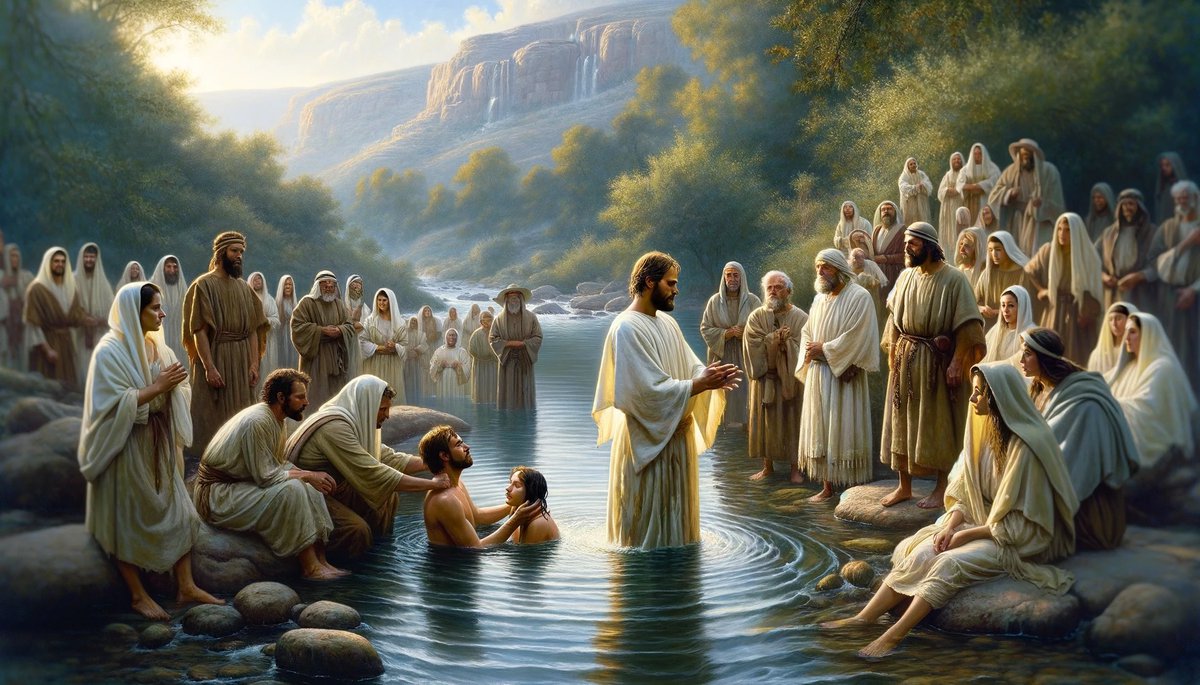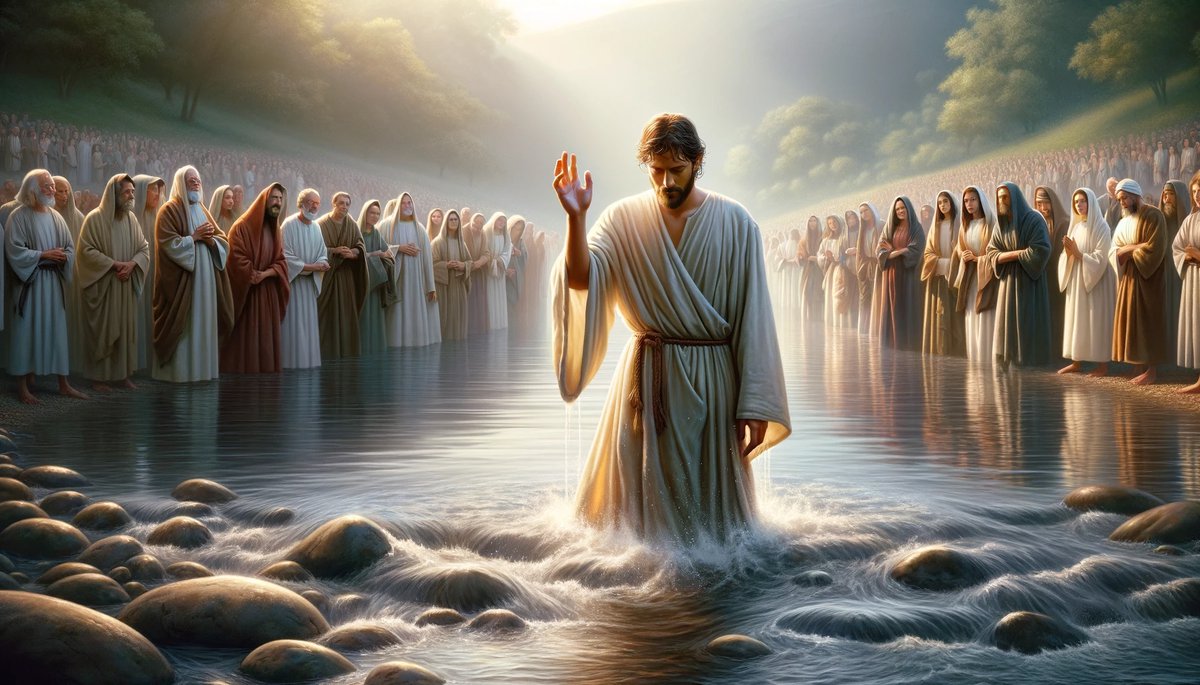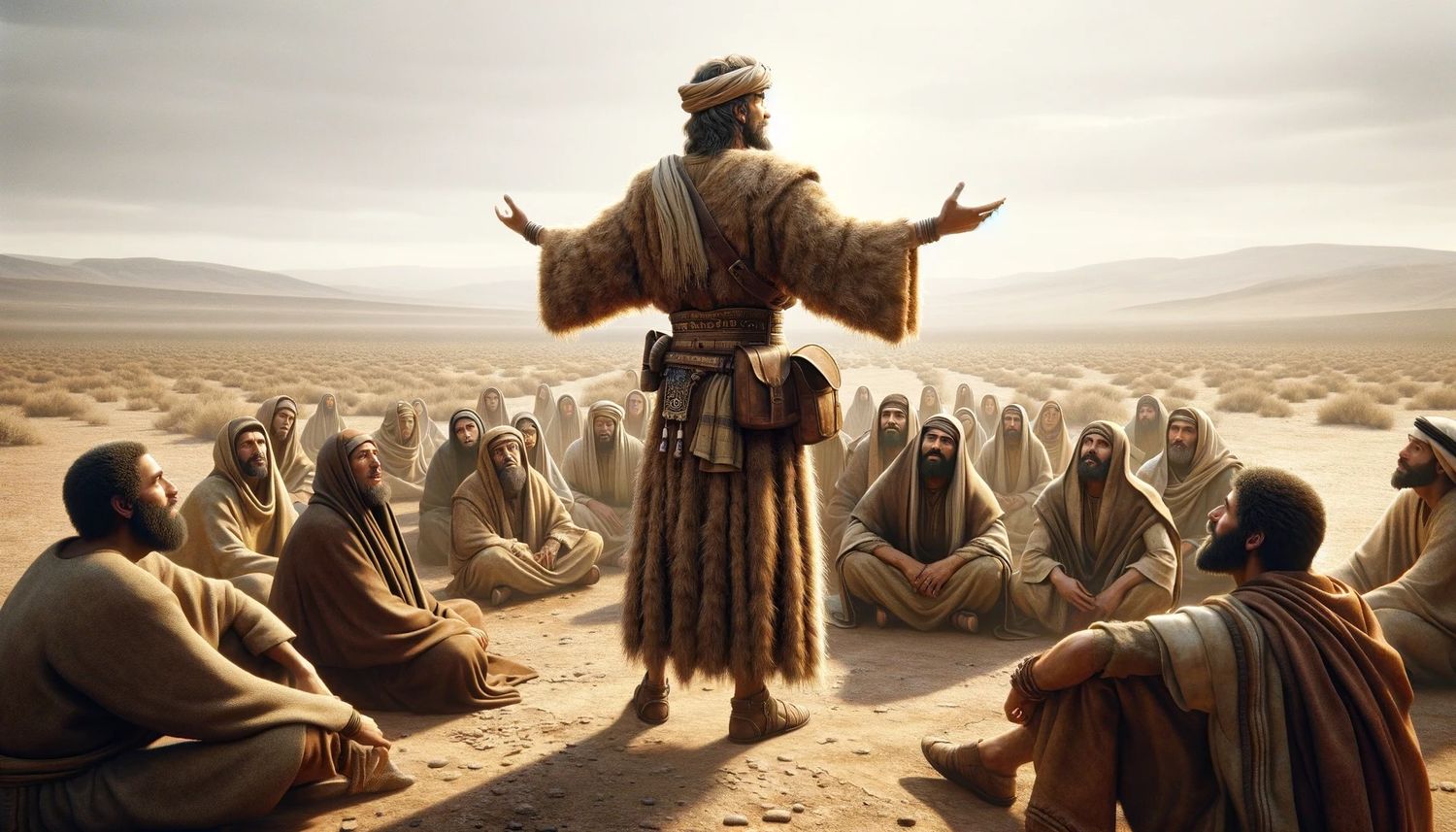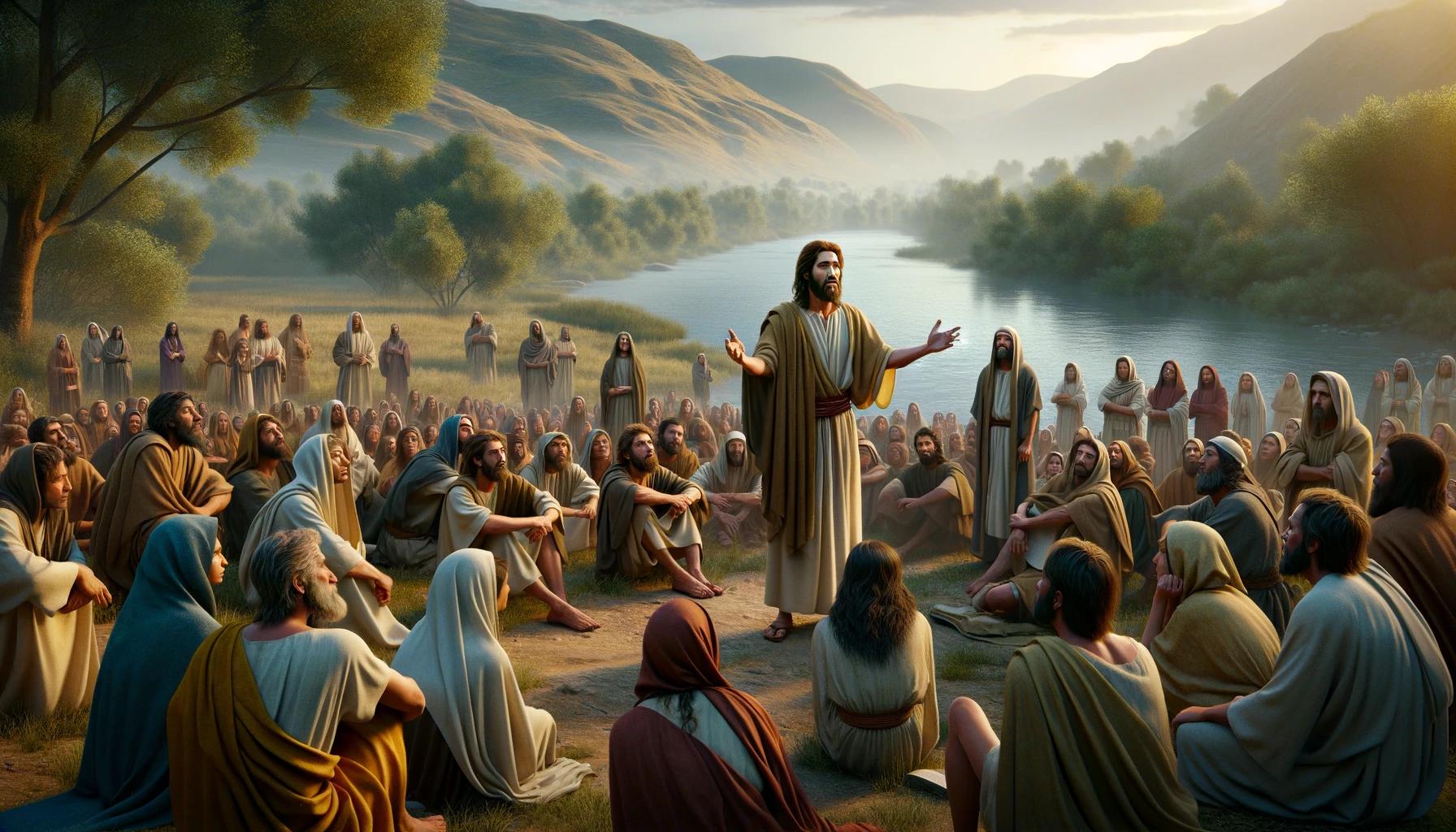Home>Theology and Spirituality>What Is The Mission Of John The Baptist


Theology and Spirituality
What Is The Mission Of John The Baptist
Published: February 21, 2024
Peter Smith, Editorial Director at Christian.net, combines deep insights into faith, politics, and culture to lead content creation that resonates widely. Awarded for his contributions to religious discourse, he previously headed a major organization for religious communicators, enhancing dialogue on faith's societal impacts.
Discover the profound mission of John the Baptist and its significance in theology and spirituality. Explore the impact of his teachings and life on faith and belief.
(Many of the links in this article redirect to a specific reviewed product. Your purchase of these products through affiliate links helps to generate commission for Christian.net, at no extra cost. Learn more)
Table of Contents
Introduction
The figure of John the Baptist looms large in the religious landscape, revered by Christians and acknowledged in Islamic tradition as a prophet. His significance transcends mere historical relevance, as his life and mission continue to inspire and provoke contemplation. John the Baptist, also known as John the Forerunner, holds a unique place in the narrative of spirituality and faith, serving as a bridge between the Old and New Testaments and embodying the essence of repentance and spiritual awakening.
The story of John the Baptist begins with a divine proclamation, foretelling his birth to an aging couple, Zechariah and Elizabeth. This miraculous conception, marked by angelic visitations and divine intervention, set the stage for the emergence of a figure destined to prepare the way for the coming of the Messiah. John's birth was not merely a personal blessing for his parents; it signaled the dawn of a new era, heralding the fulfillment of ancient prophecies and the arrival of a transformative force in human history.
As we delve into the life and mission of John the Baptist, it becomes evident that his purpose extended far beyond conventional expectations. His unconventional lifestyle, characterized by asceticism and a profound connection with the natural world, underscored his rejection of materialism and his unwavering commitment to spiritual truth. His message, delivered with fervor and conviction, resonated with seekers and skeptics alike, drawing multitudes to the banks of the Jordan River to partake in the ritual of baptism and embrace a renewed sense of purpose.
The enigmatic figure of John the Baptist continues to captivate the imagination, inviting contemplation on the nature of divine calling and the timeless relevance of his message. His legacy transcends the boundaries of religious affiliations, serving as a testament to the enduring power of faith, repentance, and the unwavering pursuit of spiritual truth. As we embark on a journey through the life and teachings of John the Baptist, we are compelled to ponder the profound implications of his mission and the enduring relevance of his message in a world hungering for spiritual awakening and renewal.
Read more: What Was John The Baptist’s Baptism For?
The Birth of John the Baptist
The birth of John the Baptist is shrouded in divine intervention and miraculous occurrences, setting the stage for a life destined to fulfill a profound purpose. The story unfolds in the hill country of Judea, where an elderly priest named Zechariah and his wife, Elizabeth, resided. Despite their devoutness, the couple was childless, and Elizabeth was considered barren. However, their lives were about to be irrevocably transformed by a celestial visitation.
One day, as Zechariah was performing his priestly duties in the temple, an angel of the Lord appeared to him, startling him with a message of unprecedented significance. The angel announced that Elizabeth would conceive and bear a son, instructing Zechariah to name him John. This revelation was met with incredulity, as both Zechariah and Elizabeth were advanced in years. In response to Zechariah's skepticism, the angel identified himself as Gabriel, who stands in the presence of God, and declared that Zechariah would be struck mute until the fulfillment of these events.
True to the angel's proclamation, Elizabeth conceived and joyously exclaimed, "The Lord has done this for me. In these days, he has shown his favor and taken away my disgrace among the people." The miraculous nature of John's conception and the divine favor bestowed upon his parents were unmistakable signs of his extraordinary destiny. His birth heralded the dawn of a new era, signaling the imminent fulfillment of ancient prophecies and the arrival of a transformative force in human history.
The birth of John the Baptist was not merely a private blessing for Zechariah and Elizabeth; it was a cosmic event that reverberated with profound significance. It marked the inception of a life dedicated to preparing the way for the Messiah and calling people to repentance. John's arrival was a testament to the boundless power of divine providence and the fulfillment of God's promises, transcending the limitations of human understanding and defying the constraints of natural law.
In the annals of religious history, the birth of John the Baptist stands as a testament to the miraculous workings of divine providence and the fulfillment of ancient prophecies. His emergence into the world was a prelude to a life characterized by unwavering devotion to his divine calling, culminating in a mission that would leave an indelible mark on the fabric of human spirituality. The miraculous circumstances surrounding his birth served as a harbinger of the extraordinary path that lay ahead, illuminating the profound significance of his life and mission.
The Ministry of John the Baptist
The ministry of John the Baptist unfolded against the backdrop of the Judean wilderness, where his compelling presence and impassioned proclamation drew multitudes seeking spiritual renewal and a deeper connection with the divine. Clad in a garment of camel's hair and subsisting on a diet of locusts and wild honey, John embodied a stark contrast to the opulence and complacency of his era. His ascetic lifestyle served as a powerful symbol of his rejection of materialism and his unwavering commitment to spiritual truth.
At the heart of John's ministry was the call to repentance, a clarion call that reverberated across the Judean landscape, stirring the hearts of those who flocked to hear him. His message was uncompromising, urging people to turn away from their transgressions and embrace a renewed way of life. This message of repentance was not merely a moral exhortation; it was a profound invitation to undergo a spiritual transformation, to realign one's heart and mind with the divine will.
Central to John's ministry was the ritual of baptism, a symbolic act of purification and spiritual rebirth. As individuals immersed themselves in the waters of the Jordan River, they symbolically washed away their past sins and emerged with a renewed sense of purpose and spiritual vitality. The act of baptism served as a tangible expression of one's commitment to embracing a life of righteousness and spiritual renewal.
John's ministry also bore the hallmark of prophetic boldness, as he fearlessly confronted the religious authorities and challenged the prevailing moral complacency. His scathing rebuke of the Pharisees and Sadducees, whom he likened to a brood of vipers, underscored his uncompromising stance against hypocrisy and spiritual apathy. His unwavering commitment to truth and righteousness positioned him as a prophetic voice in a society rife with moral compromise and spiritual stagnation.
The impact of John's ministry reverberated far beyond the confines of his immediate surroundings, drawing people from all walks of life to heed his message and undergo the transformative experience of baptism. His ministry served as a catalyst for spiritual awakening, igniting a fervent longing for divine reconciliation and a renewed commitment to living lives of integrity and moral uprightness.
In essence, the ministry of John the Baptist embodied a profound call to spiritual awakening and moral renewal, resonating with timeless relevance and enduring significance. His uncompromising message of repentance, coupled with the transformative ritual of baptism, continues to inspire seekers of truth and spiritual seekers, inviting them to embark on a journey of inner transformation and renewed commitment to living lives of righteousness and integrity.
The Message of John the Baptist
At the heart of John the Baptist's ministry lay a profound and uncompromising message of repentance. His clarion call echoed across the Judean wilderness, stirring the hearts of those who flocked to hear him. With fervor and conviction, John exhorted the people to turn away from their transgressions and embrace a renewed way of life. His message was not merely a moral exhortation; it was a profound invitation to undergo a spiritual transformation, to realign one's heart and mind with the divine will.
John's message of repentance resonated with a timeless urgency, transcending the confines of his era and speaking directly to the universal human condition. It addressed the fundamental need for inner renewal and spiritual awakening, acknowledging the inherent frailty of human nature while holding out the promise of divine reconciliation and restoration. His impassioned plea for repentance cut through the veneer of religious formalism and moral complacency, penetrating the depths of the human soul with a call to genuine and transformative change.
Central to John's message was the concept of preparing the way for the coming of the Messiah. He heralded the arrival of a figure whose sandals he was unworthy to untie, emphasizing the profound significance of the impending advent. In doing so, John positioned himself as a humble yet resolute harbinger of the divine, tasked with the solemn duty of preparing hearts and minds for the transformative impact of the Messiah's ministry.
Moreover, John's message of repentance was intricately linked to the ritual of baptism, a symbolic act of purification and spiritual rebirth. As individuals immersed themselves in the waters of the Jordan River, they symbolically washed away their past sins and emerged with a renewed sense of purpose and spiritual vitality. The act of baptism served as a tangible expression of one's commitment to embracing a life of righteousness and spiritual renewal, embodying the profound transformation that John's message sought to engender.
In essence, the message of John the Baptist reverberates with timeless significance, inviting individuals across generations to heed the call to repentance and embrace a life of spiritual renewal. His unwavering proclamation of divine truth and his impassioned plea for inner transformation continue to resonate with seekers of truth and spiritual seekers, compelling them to embark on a journey of profound introspection and renewed commitment to living lives of righteousness and integrity.
The Baptism of Jesus
The baptism of Jesus by John the Baptist stands as a pivotal moment in the narrative of spiritual history, carrying profound theological significance and symbolizing the inauguration of Jesus' public ministry. As Jesus approached the banks of the Jordan River, where John was baptizing multitudes, the convergence of these two extraordinary figures marked a transcendent moment that reverberated with divine purpose.
Despite John's initial reluctance to baptize Jesus, recognizing the vast disparity between their respective roles, Jesus insisted, affirming the necessity of fulfilling all righteousness. As Jesus emerged from the waters of baptism, the heavens were rent asunder, and the Spirit of God descended like a dove, alighting upon him. A voice from heaven resounded, declaring, "This is my beloved Son, in whom I am well pleased."
The baptism of Jesus encapsulated a profound convergence of divine revelation and human affirmation, signifying the commencement of his public ministry and the affirmation of his divine identity. It served as a transformative moment, symbolizing the anointing of Jesus with the Holy Spirit and affirming his unique relationship with the Father. This sacred event also underscored the continuity between the ministries of John the Baptist and Jesus, affirming the seamless transition from the preparatory phase of repentance and spiritual awakening to the manifestation of divine grace and redemption.
Moreover, the baptism of Jesus exemplified his solidarity with humanity, as he willingly participated in a ritual symbolizing repentance and spiritual rebirth, despite his sinless nature. In doing so, Jesus identified himself with the human condition, inaugurating a ministry characterized by compassion, empathy, and a profound commitment to reconciling humanity with the divine.
The baptism of Jesus stands as a profound testament to the divine unity of purpose, affirming the interconnectedness of the Old and New Testaments and the fulfillment of ancient prophecies. It serves as a powerful symbol of divine affirmation and consecration, marking the inception of a ministry that would irrevocably alter the course of human history and offer the promise of redemption and spiritual renewal to all who would heed its call.
In essence, the baptism of Jesus by John the Baptist represents a sacred moment of divine revelation and human affirmation, encapsulating the inauguration of Jesus' public ministry and affirming his unique identity as the beloved Son of God. This transformative event serves as a cornerstone of Christian theology, embodying the profound significance of Jesus' redemptive mission and his unwavering commitment to reconciling humanity with the divine.
Read more: Where Is Mission Trial Baptist Hospital
The Death of John the Baptist
The death of John the Baptist stands as a tragic and poignant episode in the annals of religious history, marking the culmination of a life dedicated to unwavering devotion and prophetic boldness. John's fearless proclamation of truth and uncompromising stance against moral corruption ultimately led to his unjust and untimely demise.
The circumstances surrounding John's death were fraught with political intrigue and personal vendettas. Herod Antipas, the tetrarch of Galilee, had unlawfully taken Herodias, his brother Philip's wife, as his own. John, in adherence to his unwavering commitment to righteousness, openly condemned this illicit union, denouncing Herod's actions as a flagrant violation of divine law. Herodias, incensed by John's outspoken censure, harbored a deep-seated grudge against him and sought an opportunity for retribution.
The opportunity presented itself during a lavish banquet held by Herod, where Herodias' daughter captivated the assembled guests with her dancing. Herod, in a moment of ill-considered promise, vowed to grant the girl any request, up to half his kingdom. Prompted by her mother, the girl demanded the head of John the Baptist on a platter. Despite his reluctance, Herod, bound by his oath and swayed by the pressure of his guests, acceded to the gruesome request.
The death of John the Baptist was a brutal and unjust act, emblematic of the perilous intersection between political power and moral integrity. His unwavering commitment to truth and righteousness, coupled with his fearless denunciation of moral corruption, ultimately cost him his life. However, his death stands as a testament to the enduring legacy of prophetic courage and unwavering devotion to divine truth.
In the aftermath of John's death, his disciples reverently laid his body to rest and carried the tragic news to Jesus. The loss of John, a revered and beloved figure, reverberated across the Judean wilderness, leaving a void that echoed with the profound impact of his ministry. His death served as a stark reminder of the perils faced by those who fearlessly confront moral corruption and uphold the banner of divine truth in a world rife with political machinations and moral compromise.
The death of John the Baptist stands as a poignant testament to the enduring legacy of prophetic courage and unwavering commitment to divine truth. His unjust demise serves as a sobering reminder of the perils faced by those who fearlessly confront moral corruption and uphold the banner of righteousness in a world fraught with political intrigue and moral compromise.
The Legacy of John the Baptist
The legacy of John the Baptist transcends the confines of his earthly existence, permeating the annals of religious history with enduring significance and timeless relevance. His life and ministry, marked by unwavering devotion to divine truth and prophetic boldness, continue to inspire and provoke contemplation, leaving an indelible imprint on the fabric of human spirituality.
Central to the legacy of John the Baptist is the profound impact of his ministry of repentance and spiritual renewal. His impassioned plea for inner transformation and moral renewal reverberates across generations, inviting individuals to heed the call to repentance and embrace a life of righteousness and integrity. The ritual of baptism, emblematic of John's ministry, serves as a tangible expression of one's commitment to spiritual rebirth and renewal, embodying the transformative power of his message.
Moreover, the legacy of John the Baptist is intricately linked to his pivotal role in preparing the way for the coming of the Messiah. His unwavering proclamation of the impending advent of the Messiah and his humble acknowledgment of his subordinate role underscore the profound significance of his mission. By heralding the arrival of the Messiah, John positioned himself as a prophetic forerunner, paving the way for the transformative impact of Jesus' ministry and affirming the seamless continuity between the Old and New Testaments.
The enduring legacy of John the Baptist also encompasses his unwavering commitment to divine truth and moral integrity, even in the face of persecution and unjust demise. His fearless denunciation of moral corruption and his steadfast adherence to righteousness serve as a timeless example of prophetic courage and unwavering devotion to divine principles. His unjust death stands as a poignant testament to the perils faced by those who fearlessly confront moral corruption, leaving a legacy that resonates with the enduring struggle for truth and righteousness in a world fraught with moral compromise.
In essence, the legacy of John the Baptist endures as a testament to the transformative power of repentance, the prophetic anticipation of divine fulfillment, and the unwavering commitment to truth and righteousness. His life and ministry continue to inspire seekers of truth and spiritual seekers, inviting them to embark on a journey of inner transformation and renewed commitment to living lives of righteousness and integrity. The legacy of John the Baptist stands as a timeless beacon of prophetic courage and unwavering devotion to divine truth, inviting individuals across generations to embrace the enduring significance of his message and mission.














